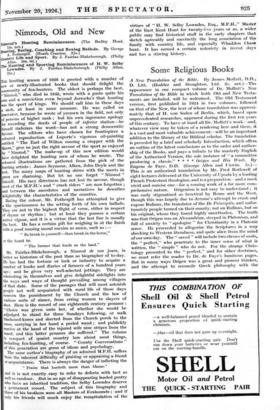Nimrods, Old and New
Nfrarod's Hunting Reminiscences. (The Bodley Head. 16s. net.) Hunting, Racing, Coaching and Boxing Ballads. By George A. Fothergill. (Heath Cranton. 218.) Country Life and Sport. By J. Fairfax-Blakeborough. (Philip Allan. 108. 6d.) NE hunting season of 1926 is greeted with a number of new or newly-illustrated books that should delight the community of fox-hunters. The oldest is perhaps the best. "Nimrod," who died in 1843, wrote with a gusto quite his own and a conviction even beyond Jorrocks's that hunting was the sport of kings. We should call him in these days a snob, at least in some measure. He was called an innovator, because he wrote of yeomen in the field, not only of persons of higher rank ; but his own ingenuous apology for recording the deeds of people of inferior station—he 'rnself italicizes the word—has .not a strong democratic flavour. The editors who have chosen for frontispiece a coloured reproduction of Laporte's vigorous oil-painting entitled " The Earl of Wilton coming a cropper with the Quom," give us just the right savour of the sport as enjoyed by " Nimrod." The make-up • of this new edition would ve delighted the hunting men of whom he wrote. The
loured illustrations are gathered from the pick of the unting artists : James Seymour, Aiken, John. Doyle and the
. The many maps of hunting shires with the meets in green are charming. But let no one forget " Nimrod " self. His racy directness has not_ ost its savour, though ost of the M.F.H.'s and " crack riders " are now forgotten ; and between the anecdotes and narratives he describes delightfully the characteristics of the counties.
Bating the colour, Mr. Fothergill has attempted to give a like spaciousness to the setting forth of his own ballads. They are not in the highest flight of verse, either in respect of rhyme or rhythm ; but at• least they possess a certain native vigour, and it is a virtue that the last line is usually the best. He has a certain gift for weighing in at the finish with a good rousing moral maxim as amen, such as :- " So break in yourself—then break in the horse," or the toast to " The farmer that lends us the land."
Mr. Fairfax-Blakeborough,' a Nimrod de nos jours, is better as historian of the past than as biographer of to-day. He has had the fortune or luck or industry to acquire a number of books and diaries of farmers of a hundred years ago ; and he gives very well-selected jottings. They are interesting in themselves and give delightful sidelights into the ways and ways of thought prevailing among villagers of that date. Some of the passages that will most astonish people not well acquainted with rural life of those days concern the punishment by the Church and the law of various sorts of sinner, from erring women to slayers of deer. Here is the record of one eighteenth century penance : " Choice was given unto her, of whether she would be adjudged to stand for three Sundays following, or walk blackened-knees and sheeted from the Church porch to the Cress, carrying in her hand a peeled wand ; and publickly receive at the hand of the injured wife nine stripes from the wand, and this latter penance she suffered." The volume is compact of quaint country lore about most things, including fox-hunting,, of course. " County Conversations " of this generation are gems of idiom and psychology. The same anther's biography of an admired M.F.H. suffers kora-the inherent diffieufty of Praising or appraising a friend x acquaintance. There is always the danger of inflicting the " Praise that hurteth more than blame."
and it is not exactly easy to refer to defects with tact as well as candour. But in an age of disappearing landed gentry who have an inherited tradition, the Selby Lowndcs deserve a permanent record. The subject of this biography and three of his brothers were all Masters-of-Foxhounds ; and if Only his friends will much enjoy the recapitulation of the
virtues of " H. W. Selby Lowndes, Esq., M.F.H.," Master of the East Kent Hunt for twenty-five years or so, a wider public may find historical stuff in the early chapters that sketch agreeably and succinctly the long association of the family with country life, and especially Whaddon Chase hunt. It has earned a certain notoriety in recent days and has a stirring history.






























































 Previous page
Previous page